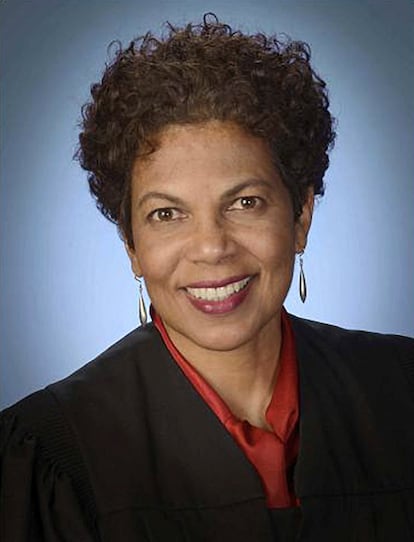The judge assigned to Trump’s Jan. 6 case is a tough punisher of Capitol rioters
U.S. District Judge Tanya Chutkan, who was nominated to the bench by President Barack Obama, will oversee the case accusing Trump of trying to overturn his 2020 election loss

The federal judge assigned to the election fraud case against former President Donald Trump has stood out as one of the toughest punishers of rioters who stormed the U.S. Capitol in an attack fueled by Trump’s baseless claims of a stolen election. She has also ruled against him before.
U.S. District Judge Tanya Chutkan, a former assistant public defender who was nominated to the bench by President Barack Obama, will oversee the case accusing Trump of trying to overturn his 2020 election loss in the two months leading up to the violent assault on the U.S. Capitol by his supporters.
Chutkan has often has handed down prison sentences in Jan. 6, 2021, riot cases that are harsher than Justice Department prosecutors recommended.

Chutkan has also ruled against Trump before in a separate Jan. 6 case. In November 2021, she refused his request to block the release of documents to the U.S. House’s Jan. 6 committee by asserting executive privilege.
She rejected his arguments that he could hold privilege over documents from his administration even after President Joe Biden had cleared the way for the National Archives to turn the papers over. She wrote that Trump could not claim his privilege “exists in perpetuity.”
In a memorable line from her ruling, Chutkan wrote, “Presidents are not kings, and Plaintiff is not President.”
Trump will make his first court appearance on Thursday before Magistrate Judge Moxila A. Upadhyaya. Such judges handle initial matters in federal cases.
Chutkan has sentenced at least 38 people convicted of Capitol riot-related crimes. All 38 received prison terms, ranging from 10 days to over five years, according to an Associated Press analysis of court records.
She is one of two dozen judges in Washington, D.C., who collectively have sentenced nearly 600 defendants for their roles in the Jan. 6 siege. More than one third of them avoided sentences that included incarceration.
Other judges typically have handed down sentences that are more lenient than those requested by prosecutors. Chutkan, however, has matched or exceeded prosecutors’ recommendations in 19 of her 38 sentences. In four of those cases, prosecutors weren’t seeking any jail time at all.
Chutkan has said prison can be a powerful deterrent against the threat of another insurrection.
“Every day we’re hearing about reports of anti-democratic factions of people plotting violence, the potential threat of violence, in 2024,” she said in December 2021 before sentencing a Florida man who attacked police officers to more than five years behind bars. At the time, that sentence was the longest for a Jan. 6 case.
“It has to be made clear that trying to violently overthrow the government, trying to stop the peaceful transition of power and assaulting law enforcement officers in that effort is going to be met with absolutely certain punishment,” she said.
Judge Trevor McFadden, a Trump nominee, suggested during a hearing in 2021 that the Justice Department was being too hard on those who broke into the Capitol compared with the people arrested during racial injustice protests following George Floyd’s 2020 murder.
Without naming her colleague, Chutkan criticized McFadden’s suggestion days later.
“People gathered all over the country last year to protest the violent murder by the police of an unarmed man. Some of those protesters became violent,” Chutkan said during an October 2021 hearing.
“But to compare the actions of people protesting, mostly peacefully, for civil rights, to those of a violent mob seeking to overthrow the lawfully elected government is a false equivalency and ignores a very real danger that the Jan. 6 riot posed to the foundation of our democracy.”
Sign up for our weekly newsletter to get more English-language news coverage from EL PAÍS USA Edition
Tu suscripción se está usando en otro dispositivo
¿Quieres añadir otro usuario a tu suscripción?
Si continúas leyendo en este dispositivo, no se podrá leer en el otro.
FlechaTu suscripción se está usando en otro dispositivo y solo puedes acceder a EL PAÍS desde un dispositivo a la vez.
Si quieres compartir tu cuenta, cambia tu suscripción a la modalidad Premium, así podrás añadir otro usuario. Cada uno accederá con su propia cuenta de email, lo que os permitirá personalizar vuestra experiencia en EL PAÍS.
¿Tienes una suscripción de empresa? Accede aquí para contratar más cuentas.
En el caso de no saber quién está usando tu cuenta, te recomendamos cambiar tu contraseña aquí.
Si decides continuar compartiendo tu cuenta, este mensaje se mostrará en tu dispositivo y en el de la otra persona que está usando tu cuenta de forma indefinida, afectando a tu experiencia de lectura. Puedes consultar aquí los términos y condiciones de la suscripción digital.








































